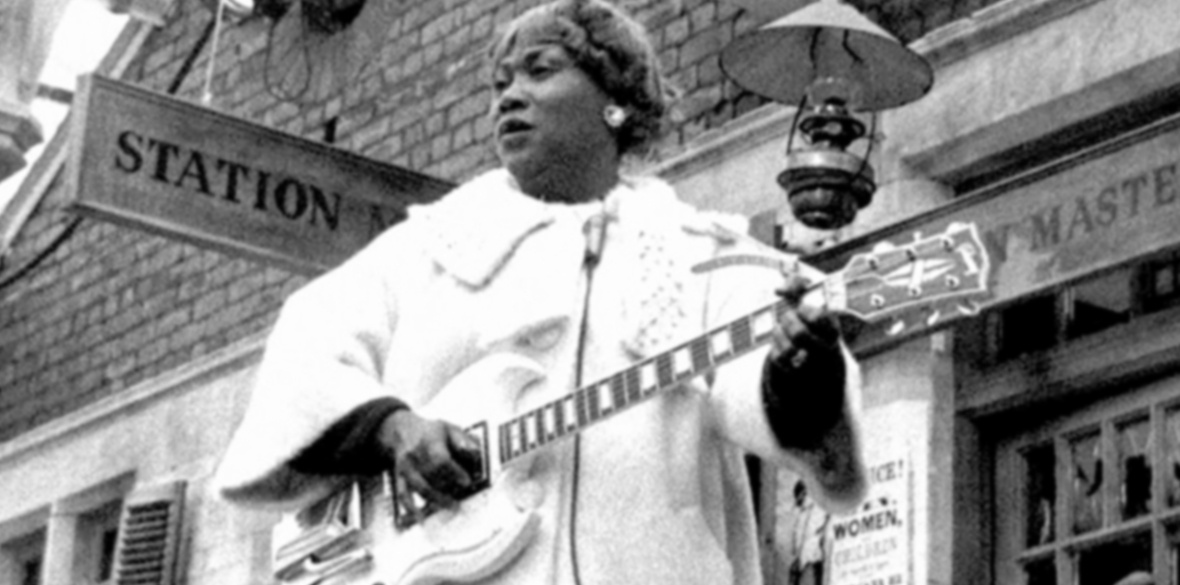This is the last article you can read this month
You can read more article this month
You can read more articles this month
Sorry your limit is up for this month
Reset on:
Please help support the Morning Star by subscribing here
ELVIS PRESLEY was the perfect cinematic subject matter for director Baz Luhrmann, not just because the opulence of Presley’s showmanship and Lurhmann’s trademark visual style are perfect bedfellows, but because it’s about the idea of Elvis, the great myth... and Luhrmann trades in myths.
What this blinkered myth is about is the “inspirational story” of a white man and how he changed everything – what it is never about is the black women singers and musicians who forged the way.
The “godmother of rock‘n’roll” Sister Rosetta Tharpe spoke wearily from the flip-side of that truth: “These kids and their rock‘n’roll is just sped up rhythm and blues. I’ve been doing that forever.”
And indeed she had. Born in Cotton Plant, Arkansas, in 1915 to a family of sharecroppers, Tharpe spent her formative years immersed in the musical world of the Pentacostal Church of God in Christ with a largely African-American congregational base.
Pentecostal churches were at the heart of the development of gospel music in the US, most famously in black communities but no less so among white Pentecostals encouraging the passion and fervour that music could arouse in a congregation.
It was in this context that young Rosetta learned to play guitar and inspire people through music - throughout her career, she moved seamlessly between the sacred and secular musical worlds, enjoying much success in both.
Tharpe’s vocal performances dance the line between speech and song, clearly drawing from listening to charismatic preachers. It is exactly the vocal choreography on which rock‘n’roll was built.
Her guitar performances pioneered distortion and string-bending techniques on newly emerging amplified instruments whose very use was championed in its earliest years by another woman, Memphis Minnie.
In Tharpe’s groundbreaking technique, you hear the direct sonic ancestry of the canonical guitar players of popular music history, players whose lineage is far more commonly credited to male guitarists such as Muddy Waters, Chuck Berry or BB King.
The sidelining of women from musical history is nothing new – it is called the “Matilda Effect.”
First described in 1870 by US pioneering suffragist, abolitionist and Native American rights advocate Matilda Joslyn Gage, it explains the tendency to attribute discoveries solely to the male colleagues of women working successfully on particular projects. Rosalind Franklin, whose work was central to the discovery of DNA’s double helix structure, has been overshadowed by Francis Crick and James Watson.
In music, it might be harder to point to specific moments of “discovery,” because identifying an exactly “new” thing is not always straightforward. But we could talk of a “Rosetta Effect,” wherein a woman’s achievements are deliberately given less attention, credit or prominence than similar ones by men.
In 20th-century popular music, there is admittedly something of a canon of great women vocalists like Aretha Franklin, Billie Holiday, Ella Fitzgerald, Roberta Flack, Dinah Washington or Mahalia Jackson all remembered, first and foremost, for their voices, not their musical innovations or instrumental technique.
In the grand narratives of popular music history, women have been carefully contained in particular roles and sidelined from others. Even Nina Simone, a classically trained pianist, is only known as the voice of US civil rights era, her exceptional piano playing left unrecognised.
Memphis Minnie’s name is nowhere near as well-known as that of her contemporary Muddy Waters.
The history of women in popular music is not as hard to trace as it may be for their classical counterparts, but the story (and indeed the reality) boxes them in to particular functions. Timeless, iconic voice is one – trailblazing musical innovators/instrumentalists is not.
Luhrmann’s film addresses the musical debt that Presley – and by extension rock‘n’roll – owed to African American musical culture. But it’s not without its problems as a representation as Presley also sits in the middle of a long and complicated history of white artists’ relationship to culture outside of the white mainstream.
This subject has been addressed by Ellen Rebecca Bishell in relation to the ongoing cultural appropriation of reggaeton.
The question of authenticity hangs heavy over Presley’s musical legacy, and it’s not a simple one to answer. The history of rock‘n’roll is inextricably linked to the long, grim history of US racial politics, and telling it requires great care and sensitivity.
We may, though, be long overdue for an equivalent story on the subject of women like Sister Rosetta Tharpe in popular music history.
Freya Jarman is reader in the Department of Music of University of Liverpool. This article is republished from The Conversation under a Creative Commons license.












